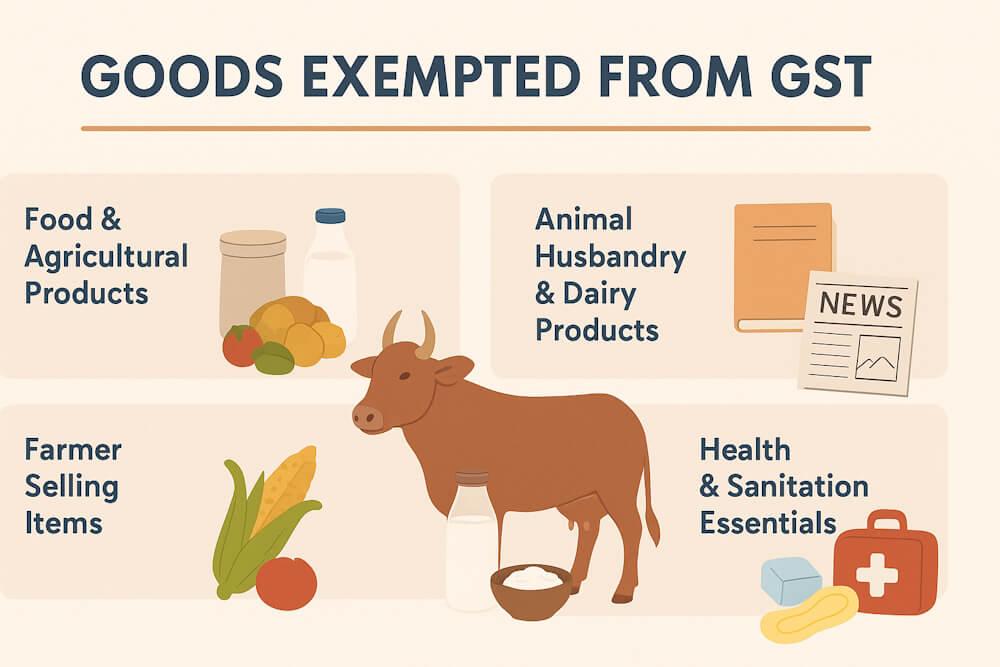When GST came into the picture, a lot of folks thought—“Oh no, does this mean I’ll be paying GST on every single thing I buy? Even rice? Even doctor visits?” The answer is no. Thankfully, the government wasn’t completely heartless. They built in exemptions.
And these exemptions matter more than people think. Because if you’re in business, knowing what’s exempt can save you from wrongly charging GST and getting into trouble. For ordinary people, it just means you don’t get taxed for basic essentials like food, healthcare, and education.
So, What Does “Exempt” Mean?
In GST language, “exempt” basically means: no GST is charged. If you’re selling something exempt, you don’t collect GST from your customer. Simple enough. But there’s a flip side—you also can’t claim Input Tax Credit (ITC) on the stuff you bought for that business.
👉 Example: A coaching center runs classes that are exempt. They don’t charge GST on student fees. But let’s say they rent a hall and pay GST on that rent—they can’t claim it back. That’s the trade-off.
Why Are Some Things Exempt?
The government didn’t just randomly exempt stuff. There’s logic:
- Essentials like food and healthcare should stay affordable.
- Education shouldn’t get pricier because of taxes.
- Agriculture and traditional sectors like handloom need protection.
- Small-value, petty items aren’t worth the hassle of taxing.
It’s not just about tax—it’s about social and economic policy.
Goods That Are Exempt Under GST
This is where most people feel relief. Imagine paying GST on rice, wheat, or milk—it would have been a mess. So the government exempted some daily-use goods.
- Food grains like rice, wheat, pulses, flour.
- Fresh produce—fruits, veggies, milk, curd, bread.
- Unprocessed food—raw meat, fish, eggs.
- Books—printed books, journals. (E-books though? Those attract GST.)
- Khadi and handloom goods—to support artisans and rural workers.
👉 Example: You buy fresh bananas from the market. No GST. But buy a packet of chips from the same shop? That’s taxable. That’s how it works.
Services That Are Exempt
Now this is where people get surprised. Not every service in India is taxed. Some are exempt completely:
- Education—Schools, colleges, universities, some vocational training.
- Healthcare—Doctors, hospitals, clinics, blood banks.
- Public transport—Metro, local trains, public buses. (Private cabs, flights, or autos are taxed though.)
- Religious services—Temples, mosques, churches, gurudwaras offering services.
- Agricultural services—Renting farmland, services provided to farmers.
👉 Example: A student paying ₹1 lakh in tuition fees—no GST. But the same student books an Ola cab to the college—yes, GST.
👉 Another one: You visit a hospital and pay for surgery. That’s exempt. But if you buy medicines from the hospital pharmacy, that part attracts GST.
Exempt vs Zero-Rated vs Non-Taxable
Here’s where most people get confused, so let’s clear it up.
- Exempt: No GST charged, and you can’t claim ITC. (e.g., fresh milk).
- Zero-rated: GST rate is technically 0%, but you can still claim ITC. (e.g., exports, SEZ supplies).
- Non-taxable: Completely outside GST’s scope. (e.g., petrol, diesel, alcohol for human consumption).
👉 Example: You export handmade shawls—that’s zero-rated, you can claim ITC. You sell milk—that’s exempt, no GST but no ITC either. You sell petrol—GST doesn’t touch it, that’s non-taxable.
Common Mistakes Businesses Make
A lot of small business owners get tripped up when they deal with exempt goods/services. Some classic mistakes are:
- Treating exempt supplies like zero-rated and wrongly claiming ITC.
- Not keeping accounts separate if they deal in both exempt and taxable goods.
- Issuing the wrong invoice—exempt goods need a Bill of Supply, not a tax invoice.
👉 Example: A coaching center issues a GST tax invoice to students for tuition. Wrong. They should issue a Bill of Supply since tuition is exempt.
Real-Life Cases of Exemptions
Let’s make this less abstract with a few everyday stories:
- A farmer sells wheat to a wholesaler. No GST. Farmer doesn’t even worry about it.
- A doctor runs a clinic. No GST on consultation. But if the doctor also sells supplements or medicines? That part is taxable.
- A metro rider pays ₹30 for a ticket. No GST. But if he books a cab to reach the metro station, GST applies on that ride.
- A private school collects fees. No GST. But if the same school runs a coaching center on the side for competitive exams, that part may not be exempt.
Why Businesses Should Care About Exemptions
If you’re in business, this is not just trivia—it directly affects your compliance. Knowing what’s exempt tells you:
- When not to collect GST from customers.
- What type of invoice to issue.
- When ITC can’t be claimed.
Get this wrong, and you could either overpay or face penalties.
👉 Example: A trader selling both exempt goods (like rice) and taxable goods (like packaged noodles) has to carefully split his accounts. If he claims ITC for everything, he’ll get into trouble.
Extra Situations Worth Noting
Some exemptions are partial or conditional.
- Handicrafts – Often exempt if turnover is below a limit.
- Hotel rooms below ₹1,000/day – Exempt. Above that, GST kicks in.
- Religious events or charitable trusts – Exempt up to certain conditions.
It’s not always black and white—you’ve got to check the notification carefully.
Final Thoughts
Exemptions in GST are not just loopholes—they’re deliberate breathing spaces. Imagine taxing every grain of rice or every doctor’s visit—people would go crazy. By keeping essentials like food, health, and education exempt, the system becomes a little more humane.
But for businesses, it’s tricky. You need to know the difference between exempt, zero-rated, and non-taxable. You need to issue the right documents. And if you’re dealing in mixed supplies, you need sharp bookkeeping.
So the next time someone says “GST applies everywhere”, you can confidently tell them, “Not true. Plenty of things are outside its net.”

